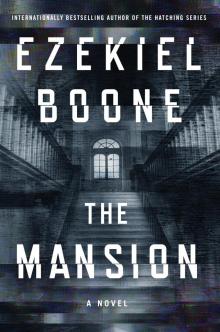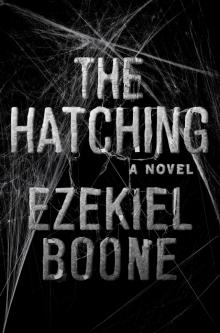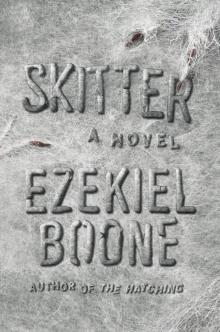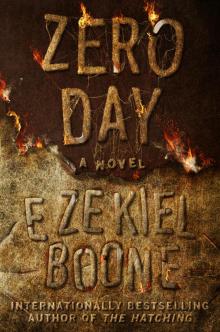- Home
- Ezekiel Boone
Zero Day Page 5
Zero Day Read online
Page 5
“Help me. Please.”
A man came out from behind a tree, lurching at him. His hair was matted and his clothing disheveled from sleeping outside.
Father Thomas stumbled back with a small, childlike shriek that embarrassed him. He was so startled that he almost ran, but the homeless man fell to his knees and stared up at him beseechingly.
“Please, Father. Help me.”
Father Thomas reflexively touched his collar. He could feel the jackhammer of his heart, but it was already passing. He simply hadn’t expected to have somebody leap out at him from behind a tree.
“Do you need something to eat? I can take you to . . .” He trailed off, watching the man closely. It was rare for him to feel physically endangered, but the sad truth was that the scourge of drugs left no man untouched. This man didn’t look high, however; he looked sick. “Do you need a doctor?”
The man sat back on his heels. His knees pushed the mulch forward a bit, and at the same time that he was leaning back his head dropped forward. He started pulling up his shirt.
“They’re inside me.”
The words came out in a low, wailing moan, like a ghost chased through a keyhole on a night full of storms, like the creak of rusty hinges being opened. When he spoke, he bared his midriff: Father Thomas could see the bloody smear.
He recoiled, taking several steps back. As he did so, he caught his heel on a root and fell backward heavily. He felt a sharp pain as his elbow smacked something hard, but even greater was his panic at losing sight of the man. But then, almost immediately, he felt himself filled with a great calmness. He allowed himself to lie there for a moment and consider. Wasn’t all flesh the flesh of God? Hadn’t he felt that he was here, in Pistol Gap, for a reason?
Slowly he sat up and then got to his feet. He brushed himself clean and moved closer.
The homeless man was crying now, a deep guttural shaking that moved his whole body, but he was still holding his shirt up. Father Thomas could see something lumpy under the skin. It almost seemed as if the man’s flesh was rippling with movement.
He felt . . . detached. He knew there was a part of him that was still shrieking. A part of him that wanted to run as fast as he could, to leave this man in the preserve and get as far away from him as he could, even though there was nowhere truly safe to go. And yet that part of him that was panicked seemed as if it were thousands of miles away. It was as if he were standing outside himself, watching his own hand make the sign of the cross and hearing his own mouth say the words, “In nomine Patris, et Filii, et Spiritus Sancti. Amen.”
Invercargill, New Zealand
Felicia Belling understood conceptually that this whole thing with the spiders was bad, but she was only eleven, so there was a limit to how far intellectualizing a disaster took her. Her parents had been exceedingly careful to make sure she didn’t see any of the videos or the news. One of her school friends, Crystal, had come over to hang out, and she had a short, grainy clip on her phone, but there was no sound and it mostly just looked like a person covered in black dots running around. That didn’t stop the two of them from discussing it endlessly, and it was clear from the way her parents were acting and what they told her—school had been canceled for weeks now, and she’d been made a virtual shut-in!—that things were not good. But still. Was it really that bad? There was no indication that any of those spiders had made it to New Zealand. Wasn’t everybody overreacting just a bit?
No, for Felicia Belling, this was all just a great nuisance.
USS Elsie Downs, Atlantic Ocean
Melanie banged her head on the doorway. Again.
Normally she didn’t mind being tall. When she shot up in height, in fifth grade, she had been self-conscious. Her father was firm about it, though: stand straight, stand tall, stand proud. By the time she hit six feet, in high school, she liked having the height. She was athletic, and on the basketball court the combination of size and speed worked to her advantage. Until the world went to hell, she had played basketball a couple of times a week. And being tall meant she could rock a pair of heels. The kind of man who was intimidated by her height was never the kind of man she was interested in anyway.
But being tall was not an advantage on a ship. Or a boat. Or an aircraft carrier, or whatever she was supposed to call it. She’d noticed that the taller sailors perpetually ducked their heads as they passed through doorways even when there was plenty of clearance. If she spent much longer on this floating city, she was sure she’d be doing the same thing.
In the meantime she would keep rubbing her head where she banged it and make the best of things. And it could have been worse. Forget even the hundreds of millions of people who’d been killed in the past couple of weeks, and forget even the hundreds of millions more who’d been displaced. She knew there were people out there scrounging for food, people who were newly homeless, people suffering in all the countless ways that people suffered when society collapsed. Forget all that. Even on the USS Elsie Downs, it could have been worse for her and her colleagues. Because of the work they were doing, they had the unimaginable luxury of having their own beds. Well, luxury might be overstating it. The sleeping quarters were essentially bunk beds stacked three high. She’d gotten the bottom bunk, with Laura Nieder in the second and her graduate student, Julie Yoo, stuck on top. With the aircraft carrier well over capacity, most of the people on board, soldiers and civilians alike, were sleeping in shifts, taking turns using the bunks, slipping between sheets that were still warm from somebody else’s body.
In the same way that she’d been afforded her own bed, a lab had been carved out for her and the other scientists. It was smaller than she was used to, and it was clearly makeshift. Still, it was well equipped. She’d been asked to provide a list of required equipment, and somebody had taken care of it. She had no idea who exactly that had been, but—given that they were on an aircraft carrier somewhere in the Atlantic Ocean, in a room that had clearly been intended as a recreation space—that person had done a good job. She felt kind of bad about it, however: much of the lab equipment bore the kind of inventory stickers that were common at universities; there was some poor professor at Johns Hopkins University who was going to have to suffer through a denuded lab. In the scheme of things, it wasn’t a big concern for her, however. She had greater worries. They all did. Will Dichtel, an entomological toxicologist, was quite snippy about the close quarters of the lab, but it seemed like a coping mechanism; he was the kind of solid midwesterner who couldn’t admit that he was terrified.
There was, simply, the weight of the entire world upon them. Earlier, her ex-husband, Manny Walchuck, had left a meeting with the president and the uniforms and come to the lab to lay it out for her: Come up with a way to stop the spiders or it was game over.
No pressure there.
She’d told him she was close but that she needed a few more days, but he was clear that time was not on her side. Because of their history, he was up front with her. The president was under immense pressure to order more nuclear strikes, which was a lose-lose proposition. Sure, maybe they’d kill all the spiders, but they’d kill all the people, too. Given their personal history, and Manny being Manny, he’d been honest about the political reality of the situation.
“But she’s the president,” Melanie had said.
Manny had looked at her in such a way that it was clear that, once again, she was being naïve about politics.
She’d promised to do what she could, but it felt like an empty promise. You could hurry your research only so much. That had been a few hours ago, and when he’d left the lab, she’d been glum. The good thing, however, was that she and her team were able to lose themselves in their work. They were all scared—Melanie, Julie, Laura, Will, and Mike Haaf—but they were also focused on solving a puzzle. There were times when Melanie forgot why she was doing this research and got excited about the sheer intellectual curiosity of it all. How did the spiders breed so quickly? How did they seem to coordinate their
hatching cycles? Why was it that some people were stripped to the bone by the swarms of spiders and others were left alone? How was it that when a spider ate its way into a person’s body to lay eggs, the wound almost zipped itself closed? And how, above all else, were humans supposed to fight back?
The amazing thing, and what she loved about being a scientist, was that for all of the pressure, all of the fear, they were starting to hit on real answers. Solutions. Hope. In the lab, Laura and Mike were in the air lock—the makeshift glass room within the room that would, in theory, keep things contained if somebody made a mistake with one of the eleven insectariums—getting ready to pull a single spider out for study. They’d noticed that one of the spiders had isolated itself, and they wanted to dissect it to see if there was something biologically unique about it compared to its brethren. In the far corner of the lab, Will had managed to extract venom from both the standard black spiders and the version with the red stripes across their backs. He was using a pipette to test both kinds of venom on samples of rubber, to confirm the efficacy of using hazmat suits safely in spider-infested environments.
She turned to look out in the hallway to see if the sailor who’d been tasked with bringing them lunch—or was it dinner? she’d lost track of time—was returning, and banged her head on the doorway. Again.
But it did nothing to dampen that jubilant feeling. They were onto something. Rubbing her head, she sat down on a stool next to Julie. Julie swiveled her laptop so Melanie could take a look.
“Basically,” Julie said, jumping right in, “the trade-off is life expectancy.”
“Like a Bernese or a Newfoundland or something?”
Julie narrowed her eyes, confused.
“Sorry,” Melanie said. “Dogs. They’re dog breeds. Big dogs. My parents had Bernese mountain dogs, but they live only, like, seven or eight years. They’re huge balls of fur. Beautiful, sweet dogs. We almost always had two of them at any one time, sometimes three, but that meant that every couple of years we were putting one of them down. Honestly, it’s one of the reasons I never got a dog of my own. My memory of having dogs as a kid is of crying all the time.” She tapped the counter. “But it’s the same point. The bigger the dog, the lower the life expectancy.”
Julie nodded. “Except that’s not what we’ve generally seen in spiders. Also, I’m more of a cat person.”
“I like both. But that’s beside the point.” Melanie rubbed her eyes. “Good Lord, I could use a nap. Okay, you’re right. More or less, the bigger the spider, the longer the life expectancy. What’s the life span of the Goliath birdeater? Twenty years?”
“For the females,” Julie said. “Across the board, females in the Theraphosidae family? Yeah, easily fifteen or twenty years. There are plenty of tarantulas hitting thirty and even forty years. The smaller spiders are the ones that go quick.”
“Well,” Melanie said, gesturing toward the glass and Mike and Laura, “these sure as hell aren’t part of the Theraphosidae family.”
“Technically, you’re probably in line to name them,” Julie said.
“Right now that’s not at the top of my priority list. Writing a paper and—”
“Whoa, whoa. You’re taking that a little too seriously, Melanie. I wasn’t thinking of an actual taxonomic name. I’m not worried about proper biological nomenclature. We don’t need Latin. But it would help if we had something to call them.”
Melanie was taken aback. “I like the name Swarm X. I think—”
“Melanie. Please. Honestly.” Julie reached out and put her hand over Melanie’s. “You’re the only one who thinks Swarm X is a good name.”
Melanie fidgeted on the stool, narrowed her eyes at Julie, and then, finally, sighed and smiled. “Fine. You know, a couple of weeks ago, when you and Bark and Patrick . . .” She took a deep breath and they were both quiet for a moment, thinking about how Bark, one of the other graduate students who’d been working for Melanie, had been infested. A surgeon had him on the operating table and was trying to remove the eggs that were threaded through his body when the spiders hatched. And Patrick was in the operating room. Wrong place, wrong time. It wasn’t that Melanie had forgotten about what happened to her two other graduate students, but saying their names aloud hurt.
She continued: “When the three of you came to my classroom, when this all started. Do you know one of the things I didn’t understand? I didn’t understand how somebody as smart as you could be so lacking in confidence. Well, silly me. Here I am a few weeks later with Ms. Julie Yoo, who now has the gumption to tell me that the name I came up with for these spiders is dumb.”
“I didn’t say dumb.”
“Hell Spiders? I mean, I said they’re sure as hell not part of the Theraphosidae family.”
Julie considered. “Hell Spiders. Yeah. Actually, that’s not bad. It’s a lot better than Swarm X spiders.”
“Okay. It’s official. They’re Hell Spiders,” Melanie said. “Now, what were we talking about?”
“Uh, size?”
Melanie laughed and got off her stool. “We’re all a little punch-drunk.” She walked over to the door and, carefully bending to make sure she didn’t bang her head this time, stepped out into the hallway. She turned to one of the sailors standing in the hall. There were always five or six sailors out there. It wasn’t clear if they were supposed to be standing guard or not, but the scientists had taken to treating them as glorified gofers. “Can somebody please check on our food? And I need somebody to get coffees for me and . . . Dr. Yoo. And don’t get them from the mess. Get them from that fancy place. They know what we like.”
One of the sailors took off at a brisk clip, and Melanie stepped back inside the lab. Julie was staring at her.
“Dr. Yoo? Did you just call me Dr. Yoo? You called me Ms. Julie Yoo, like, thirty seconds ago.”
Melanie shrugged. “Screw it. I figure after everything that’s happened, you’ve earned your PhD.” She sat back down and pulled Julie’s laptop closer. “So we’ve got three different kinds of Hell Spiders. The black ones. They breed and grow at an astronomical rate, and they burn out just as quickly. Then there are the ones with the red stripes, which also hatch and grow crazy fast. And then we’ve got the jumbo ones.”
“The queens,” Julie said.
“What?”
Julie glanced away, blushing. “Sorry. I’ve been thinking of them as the queens. Silly.”
“Yeah. No. Maybe,” Melanie said. “I don’t know. Why have you been calling them that?”
Julie pulled the elastic out of her hair, swept it back into a ponytail again, and then secured it with the same elastic. As far as Melanie could tell, it looked exactly the same.
“I don’t know. It’s just, well, they’re all the same species, right? If you didn’t know better, you’d think they were really three different spiders, but they’re all the same. I mean, the original spiders laid the eggs that hatched the red-striped ones and, as far as we can tell, the queens, too. Have you ever seen one of those photos that puts the tallest and biggest Olympic athletes with the smallest?”
Melanie nodded. They were always amusing. You’d get some seven-foot center on a basketball team standing next to some gymnast pixie who barely reached the basketball player’s waistband.
“If you were an alien, you’d never look at those two people and think they were from the same species. And it’s the same thing with the Hell Spiders. They don’t look the same, but they really are. So I’ve been thinking about that and about what you said when this first happened: that we’ve got feeders and breeders.”
“Well,” Melanie said, “that was a crude way of thinking about it.”
“Sure, but you weren’t wrong.” Julie pulled the laptop back and switched over to a spreadsheet. She ran her finger down one of the columns. “It’s borne out in the data, right?”
Melanie was distracted for a moment by shouting. She’d left the door to the hallway open when she asked for coffee, and even though the voices were fa
r away, she could sense the urgency. And then the sailors outside the door started shifting and ran off. Whatever it was, she thought, it didn’t have anything to do with them.
“So the simple version is that we’ve got the first wave, the black ones. They come out, well, like a wave. They wash over everything in their path. It’s so overwhelming, just the sheer numbers, that anything that could be a threat is neutralized. Even if the spiders had natural predators, there wouldn’t be enough of them left to be a real danger. And whatever they don’t eat is either available as food for later consumption or serves as an incubator for the second round of black spiders. Then, once they’ve spread out far enough, they pull back and lay more eggs. They’re the breeders. So this is all the first wave. But then we get to the second wave.”
“The red stripes.”
“Right. The second wave are the feeders, because, near as we can tell, that’s what they do. They wrap up whatever prey they catch—”
“Whatever or whomever is left from the first wave,” Melanie interrupted.
“Right. Near as we can tell, the spiders don’t eat one out of every five people—”
“Or goats or rats.”
Julie stopped and waited.
It took Melanie a second. “Sorry,” she said. “I’ll stop interrupting.”
“Or goats or rats,” Julie said, nodding. “One out of every five. But we’re clear, they don’t leave one out of five alone. They leave one out of five alive. Of those, about one in ten gets used as a sort of surrogate.” She hesitated. “God. Bark. And poor Patrick.”
Out in the hallway, there was the sound of thumping boots, and then ten or fifteen sailors went past at a dead run.
“That’s weird,” Julie said.

 The Mansion
The Mansion The Hatching
The Hatching Skitter
Skitter Zero Day
Zero Day